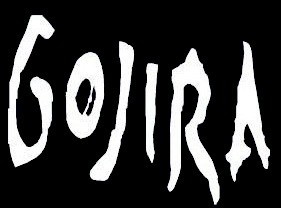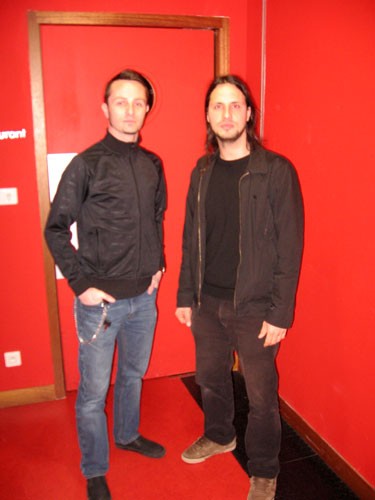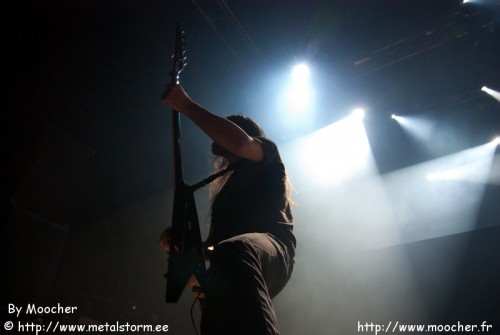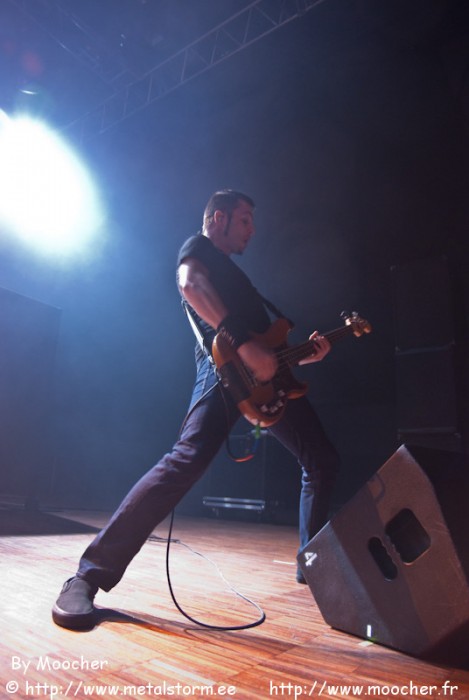Gojira interview (03/2009)

| With: | Jean-Michel Labadie (bass) & Christian Andreu (guitar) |
| Conducted by: | Darkside Momo, FreakyMarge (in person) |
| Published: | 02.03.2009 |
|
Band profile: |
Gojira |
Gojira... The best known French metal band, and surely one of the best.
As they were touring all around France, we couldn't miss the opportunity to catch the big green beast and ask it a few questions... So Christian and Jean-Michel kindly answered us, before their show in Toulouse.

Darkside Momo: Well? First I wanted to talk a bit about your previous shows and tours, and particularly the show you played in Arras, when you opened for Metallica? So, how was it?
Jean-Michel (bass): Well, er? It was, and still is, a completely crazy memory... To be there, to tread on the same stage as the band that gave us the urge to do this, it was a childhood dream. I know that I had goosebumps, I wanted to cry, laugh, jump, and share all this with everyone... It was a real celebration for me to open for Metallica and to play with my band. So, it was many blended emotions, and a great joy to be able to do it.
Christian Andreu (guitar): Yeah it was crazy, crazy... It's difficult to put it into words, that's a dream come true.
DM: And, are there any other bands with whom you'd want to share the stage?
JM: There still are, yes.
C: For me it would be Tool.
JM: Yeah, Tool. We could also name... Meshuggah, stuff like that. Or Neurosis.
DM: And about the tour with in Flames, that you finished a few months ago I think...
JM: ...One month and a half...
DM: ... how was it?
JM: It was great, it went off really well. We got along very well with the crew working for In Flames too, so it was a tour that... it was a big family travelling. And then, of course, the first part of the tour was in Europe, and we went playing in countries that we never really explored before. So we were able to see the status of the band there.
DM: Which countries, for example?
JM: We never really went to Germany before, we had played in two festivals; but festivals are a bit like an industry, there's a lot of stuff going on, so focusing on one band is not that easy! In a venue, that's another story. So we've been able to try how it was for us in Germany. We felt that the reception was a bit... er...
C: Colder...
JM: Colder, but attentive. And we went to Italy for the first time, and there the reactions were really hot! (laughs) We also explored Spain a bit more, and we felt that we took hold there too, that they understood our percussive style... and that's it. So, in Europe it was great to be able to see all these countries in one month and a half, to have a part in all this! Then, well, the second part was in the States, it was the fourth time we went there, and we found out that a lot of people that came to see us during our first tours, came back with new friends.
DM: The word's being spread...
JM: Exactly, and it makes us happy! So we got home tired, but happy and full of memories, of stuff... And eager to go back!
DM: And when would it be?
JM: In the States? This year...
DM: Do you have a headliner tour planned, or not?
JM: That's in the works, yes. This will be our first headliner tour...
C: In May.
JM: Yeah, in May. But we're talking about taking a rest before...
C: Yeah. But that's what we're up to.
JM: So this will be our headlining tour, and 2009 will be mostly headlining for us. And this is a relief because, after 2 years passed as the opening band, to develop ourselves in foreign countries... Because it is a bit as if we started again from scratch, whereas we're quite renowned in France, and so this is great, it's a bit like an apotheosis, to be able to propose our show and our music for a longer time, for people who would like to see it differently and not 30 minutes.

Jean-Michel (left) and Christian (right)
DM: That's nice you've already answered my next question! (laughs)
FreakyMarge: Do you think that all your audiences have something in common? In the various countries you've been to, can you find similarities or do they all have their own way to react?
C: Well, first of all, they all are metalheads (laughs), but it's true that in every country it's different? In Germany, they were a little? they were wondering "what's that band? We heard about them, let's see..." And they were a little like that (he makes a serious face) they weren't moving. In Spain it's a big success, in Italy it's always like an explosion, so it depends on the country, but metalheads stay metalheads, they're moshing, stage diving? In fact it's more in the US that we can see the difference between Europe and them, because over there, they're already listening to metal when they're 6 years old, it's a more popular culture and they don't hesitate: if they like a band, it's boom "let's go there and mosh, let's party..."
DM: Even more than in Germany? Here in France we have this image of Germany being a metal country and it seems colder, the way you describe it?
C: Well, we feel that the audience don't let go as much as others... I don't know, there are different ways to see this I think but it's true that in the US, the guys are screaming, even those who are in the back of the venue.
JM: It's very spontaneous?In fact the Americans have had that kind of music for a long time I think, a lot of music comes from there, they have big music industries and as a band you have to fight hard to exist so they're doing a real show, people love that, they want to see a big show and craziness. The consequence is that the audience is very spontaneous. In Europe you have a few spontaneous people but they are mixed in with the critical ones, the sceptical ones? In Europe you have old cultures, Europe is old somehow! America is a new nation, it's crazier? Europe and US have quite the same size, but Europe is made of different countries and cultures and so of different temperaments and dispositions.
DM: Next, about this summer... What about festivals? I know you'll be at Hellfest, but are there others?
JM: Well there's the Printemps de Bourges, and... What else... There will be many, I know some are still waiting for confirmation.
C: Well it's still in the works, you see. It's true that there are these two, but we'll do about fifteen I think.
DM: Nice!
C: Yeah, yeah, I think we'll be on big ones this year...
JM: Yeah, from early June, when it begins, up to mid-August, we'll be kind of everywhere.
C: There's one that bodes really well in Spain...
JM: Yes but we can't speak of it! (laughs)
C: That's what I was about to say, you'll probably learn more soon!
DM: And Wacken, maybe?
C: Not this year for Wacken. The bill is already complete... There was no place on it. Sadly.
JM: We would have really liked, it still is THE European metal festival. Next year maybe!
DM: Now, I have two questions about The Way Of All Flesh. Why is this album so dark? Especially compared to From Mars To Sirius, which was really bright (at least I felt that way), and awesome because of that! Bright death metal... So why this 'step back', so to speak, towards something darker?
JM: Well Joe would be the best to answer this question, but we share his stuff a little I think. So you find this darker side because, for the past two years we had to defend and promote the band in foreign countries, so it was like starting from scratch again. Starting like a young band who opens for a bigger one: you put on your stuff when told to do so, you play 30 minutes and that's all, you live it all the hard way. So living this for two years made us grind our teeth and also gave us the will to go on. So people saw we were dedicated... There's also the harshness of this life, as we were on the road for more than 8 months a year, 160 shows a year...
DM: It must be tiring...
JM: It is tiring. We went through times that were psychologically really hard, and I think it is what made this album a bit darker, a bit more furious... I don't know, I just say that, but maybe Joe felt some sensations of death, of "aarrrgggg"... We were crushed under all this, we fought in it, and he wanted to address these subjects too, death in general, on many levels. So it shows in the music.
And also, mixing with many different bands, Swedish, American... that are really metal, and seeing how they were reacting, how they were, their music, sometimes it made us wonder. This ultra violent and primitive side that they put into it, and this probably influenced us somewhere, to live with these guys for months on the road...
So it's a mix of many things. An evolution that led to our stuff being a bit more straight to the point, direct, and a bit more sombre too.
C: After that I think that Joe likes subjects that are a bit philosophical. You know, he's a philosopher, poet, artist, and all that. So, it's the first album that's about introspection, he tackles some universal problems, you see... I think that we all think about death, especially when you're thirty... So I think it all came naturally, with what we have lived and stuff...
DM: So it was a bunch of questions that would have come one day or another...?
C: That's it, it was logical. He deals with spirituality, introspection, the state of the planet, or environment... "Oh shit, forgot about death... So let's talk about death, then!" (laughs)
JM: He likes to talk about stuff that appears to be a little taboo, I think, in European societies or culture. We don't speak about death, it's frightening.
DM: No, we elude the subject as much as possible.
JM: That's it, and so he wanted to explore it and show that death could be beautiful too. But it's not only death as in "a person dies", it's the death of many things, of a state of being... For example, a person is in a certain way, five years later he or she changes so it's the death of the previous self. It can go quite far...
DM: Death and rebirth to go towards something else...?
JM & C: Yeah, yeah, exactly...

DM: And the other question is about Toxic Garbage Island. What is it about really? What's this story with this plastic bag?
C: In fact, from what he explained to me (I didn't know beforehand), apparently there's a place on the planet, I think it's in...
JM: ... the Pacific Ocean...
C: ...in the Pacific Ocean that, because of the maritime currents, carries in fact all the shit...
JM: ...all the garbage thrown in the oceans converge towards this stream, and when they are carried that creates this 'hole', that was called the Toxic Garbage Island by the Americans.
C: Apparently it really is an island made of plastic bags, garbage and floating shit.
JM: And this came... Well Joe had a dream one day, in which he imagined he was in the water, well I don't really know but it was something like that, and he was a turtle stuck in a plastic bag... The will to speak about this is a part of our commitment about ecology.
DM: Do Greenpeace still have a stall at your shows?
JM: Yes. Well they can't come to every show, for example yesterday in Montpellier they were there; it's something that's important for us. Increasing public awareness... And some go, some don't, we don't force them.
DM: And what do Greenpeace gain? More adherents, maybe?
JM: In practical terms we don't really know... We ask them to come because we are involved in the stuff, but after that everyone is free to do it or not. If they come, they certainly gain something, to pass the word and show what they're doing, and increase people's awareness to all this...
C: Generally we go and see them after the show, and so the guys tell us "yeah, that's great!" But after that it's true that we don't ask them about the way they are satisfied. I think it has some results when there are 1000 people coming, like this evening. There's at least a handful that will go and see them, so that's already a victory.
Marge: Speaking about your commitment with Greenpeace and stuff, do you think that it's a part of your originality? What vision do you have concerning your music, what makes you think that you are original?
C: We are inside it so we don't tell ourselves "we are original" or "we're not"?we are who we are, you know. It's true that in everyday life I eat organic food, I try to do things as I can, at my level, to feel that I have a little impact because of what I buy or consume. I think Joe and everybody in the band is like that. Music is just a part of us. Whatever we do in our lives, whatever our job? Actually we found ourselves playing music and in that music you can find who we are, you know. It's true that those themes are quite rare in metal bands so in consequence it can bring an original side to Gojira. But we don't do that to be original; we do that because we are like that.
JM: It came naturally I think.
C: I think that if Joe was writing lyrics that would go in the opposite way I personally would quit the band. For my part it's my battle in life too. You know, Joe is the leader of the band, he composes and writes the lyrics and my personal battle is that band, to touch thousands or even millions of people. So it represents my commitment, to follow that guy because I believe in what he says, I agree with him, we think the same things.
Marge: Actually, I would say that music represents your more efficient way of expression?
C: Yeah exactly. That's exactly what I wanted to say.
Marge: And if it hadn't been music? I mean, I always wonder how bands begin in music?Have they been 'called' by the music? Have they really chosen that? Have they worked specifically for that? Is it innate, or is it destiny?
C: I think it's everything you've just said.
Marge: Ok (laughs).
C: It's a mix of everything?you see?
JM: We don't really know that we're going to dedicate ourselves to that. When I was young, 11 years old, I heard Metallica, it gave me goosebumps, I didn't know what it was, what metal was but it touched me, that electric guitar and everything?And little by little, I began to listen to Iron Maiden, Pantera?and then you're 15, 16 years old, somebody at school has a guitar and says "come to my house I've got a guitar and I will show you some stuff!" He plays some chords and "woah!!" it appeals to you. And then you begin to watch some videos of bands like Metallica and then you know a guy who's playing drums and it begins like that. And the first time that we play in a bar in front of two guys we're like "yeah it was so great!"?
C: Yeah, for my part, I truly believe in destiny, but one that is not necessary written when you're born. I do agriculture and I often take this example: when you sow a carrot seed, it becomes a carrot even though it is very small at first. It's very down-to-earth, it's a basic example. And when you come on earth, you're nothing at first, and then you become somebody. So, for me, I think that we must become what we must become. But to do that, you have to listen to yourself and follow your intuitions, to know "am I feeling good in that life? Am I in my element?". Without that, you stop, and try another thing. And if you can do something that belongs to you, you're going to blossom and you'll be?I don't say "happy" but you'll know that you'll be in your element and into what belongs to you. You see? So I think there is a part of destiny.

Marge: I was wondering? What do you feel when you're listening to your music? Are you completely satisfied? Is it only a part of your past?
C: Hum?personally, I feel like I'm on the outside of it because I compose very few things, I bring 2 or 3 little ideas, it's Joe and Mario who compose so I'm feeling outside of this. Maybe they'll answer differently but when I listen to the band that I am in and that I am involved in, it's very hard to stand back. We are completely involved in the music, the tour and everything, so when we're listening to our music, we don't only hear the music, we're listening to the guys who are going to listen to it, we're listening to the people who have worked on it, the commitment, the past, what's going to happen, the tours, you know? It's almost not music anymore. Thousands of things surround it. But it's a great pleasure too, to know that when you are listening to it, millions of others know it too. It's not only a friend of yours, we're all listening to this little hour of music we've created?and that's wonderful.
DM: My last question was about your studio. Did it withstand the big storm of a few weeks ago or did trees fall on it? [the 24th of January, a really big storm ravaged the Southwest of France]
JM: By chance it wasn't hit... But it's true that there was a lot of damage in the area. We've been spared.
DM: Well, thanks for everything! One last thing to add for Metalstorm readers, maybe?
Marge: Do you know Metalstorm?
C: No, I don't know, no...
JM: I used to know...
(laughs)
C: But I'll know, I'll check!
JM: And well... Be crazy, keep on listening metal...! (laughs)
C: And also... Thanks to all the French people for supporting us. I really feel a consecration, a link of love... I really love what's between the band and the audience, and it's really moving...
JM: Since the very beginning of this French tour we feel a really strong and sincere support from the people and it's really moving. It's really great on stage.
Thanks again to Christian and Jean-Michel for they kindness!
 | Posted on 02.03.2009 by Once your regular Hellfest reporter, now retired. I (strangely enough) listen to a lot of metal. And enjoy good beers, comics, novels and role-playing games. |
Comments
Comments: 5
Visited by: 215 users
| -DC-002- Mastercommander |
| MetalManic |
| Darkside Momo Retired Elite |
| dCepT |
| JD Account deleted |
Hits total: 11464 | This month: 1




 I'm looking forward to see if they really do headline an American tour around May.
I'm looking forward to see if they really do headline an American tour around May.



 am looking for the next one with other Gojira's members
am looking for the next one with other Gojira's members